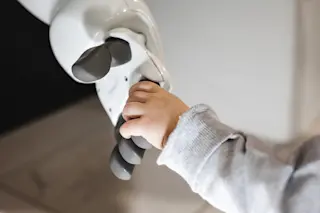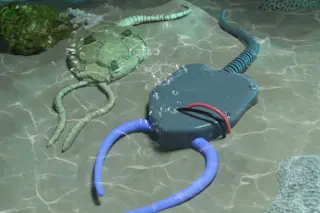Researchers have built a "biological brain" for a robot using a dish full of rat neurons, and have harnessed the neurons' electric signals to navigate the robot around a pen. Researchers say the experiment should add to their understanding of how brain cells function, and could provide insight into what goes wrong in neurons affected by diseases like Alzheimer's and Parkinson's. The robot's
controller nestles inside a small pot containing a pink broth of nutrients and antibiotics. Inside that pot, some 300,000 rat neurons have made - and continue to make - connections with each other. As they do so, the disembodied neurons are communicating, sending electrical signals to one another just as they do in a living creature [New Scientist].
The neurons' automatic drive to connect and communicate may be an indication of how sturdy brain cells are; researcher Steve Potter, who has been involved in similar experiments, says ...













